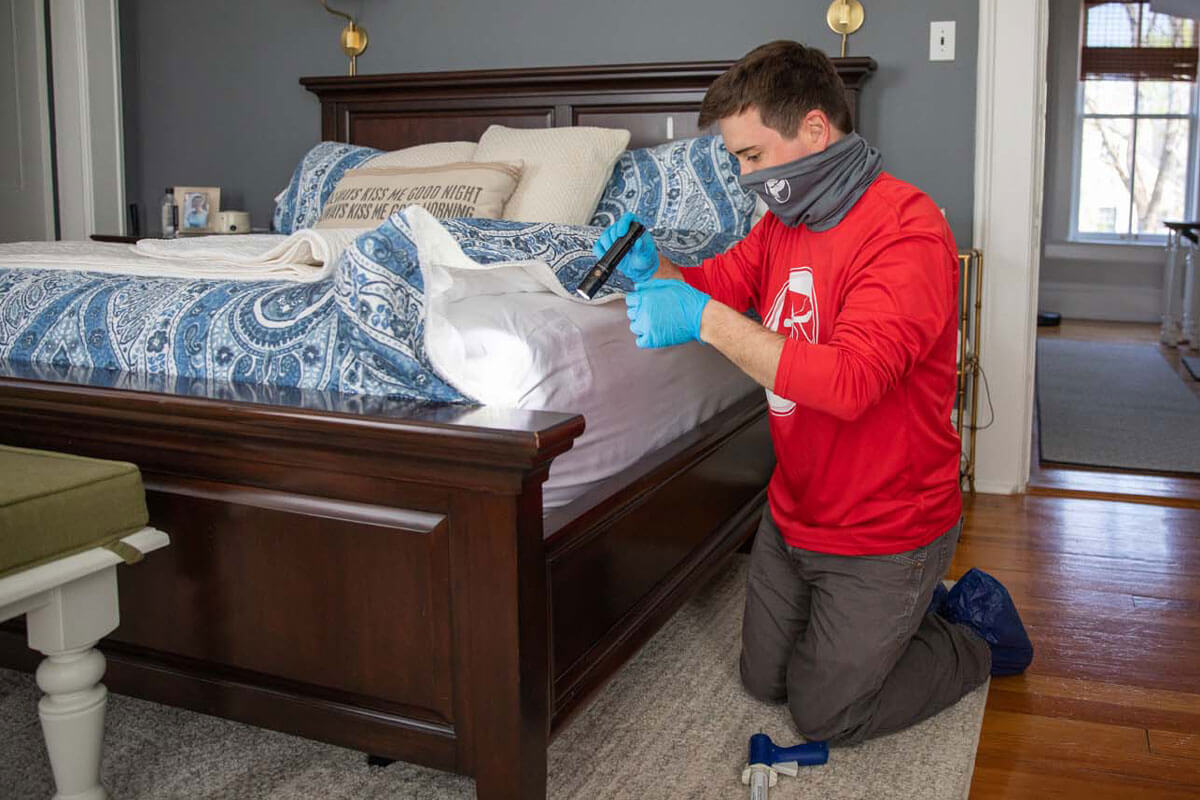Effective Kings Bug Control Cincinnati Ohio: Reliable Solutions
Effective Kings Bug Control Cincinnati Ohio: Reliable Solutions
Blog Article
A Failure of the Different Kinds Of Parasite Control Solutions
In the world of pest control, a multitude of approaches exist to attend to and combat the visibility of unwanted animals. From the traditional use of chemical pesticides to extra ingenious biological control options, each approach uses distinct benefits and limitations. As we browse through the varied landscape of pest control options, understanding the ins and outs of each method ends up being critical in figuring out the most efficient strategy. Remain tuned as we explore the nuanced world of bug control strategies and find just how each type plays a special duty in protecting our atmospheres.
Chemical Pesticides
Chemical pesticides are typically utilized in bug control to properly remove a wide variety of pests and various other pests. These chemicals function by targeting the nerve system of the parasites, interrupting their regular features, and ultimately resulting in their demise. The use of chemical pesticides has been a staple in the pest control industry for decades as a result of their performance and quick outcomes.

Nonetheless, it is necessary to use chemical pesticides with caution as a result of their potential dangerous effects on the atmosphere and non-target types. Inappropriate application or overuse of these chemicals can cause contamination, harm to useful pests, and resistance development in bug populations. It is important to adhere to security guidelines and guidelines when making use of chemical pesticides for bug control.
Biological Control Methods
Considering the possible ecological influences and dangers related to chemical pesticides, organic control methods offer a more lasting strategy to taking care of parasite populaces. Biological control involves using all-natural opponents, such as killers, microorganisms, and parasites, to reduce insect populations. This approach is commonly a lot more targeted, influencing just the particular pest varieties while lessening harm to beneficial pests, humans, and the setting.

One benefit of organic control is its long-term effectiveness. When developed, all-natural enemies can help manage pest populaces constantly without the requirement for duplicated applications of chemicals. Furthermore, organic control is usually more affordable and can help in reducing chemical resistance in parasite populaces with time. In general, biological control methods offer a sustainable and eco-friendly solution to pest management.

Mechanical Insect Control
Mechanical pest control entails the physical manipulation or removal of parasites to manage their populaces efficiently. This approach is typically employed together with various other insect control approaches for detailed pest administration. One typical example of mechanical parasite control is using catches to capture rodents or pests. These catches can be established in linked here calculated areas where insects are recognized to dwell, aiding to decrease their numbers.
One more mechanical strategy is making use of barriers such as fences, internet, or displays to obstruct parasites from entering specific areas. By physically stopping parasites from accessing an area, the likelihood of infestations or damage can be considerably minimized. Furthermore, hand-operated approaches like handpicking parasites off structures or plants can be effective for smaller-scale invasions.
While mechanical bug control techniques can be labor-intensive, they use a non-chemical option that can be ecologically pleasant and sustainable. By targeting pests directly, mechanical control strategies can help maintain bug populations in check without counting on chemicals.
Natural Solutions
Using all-natural treatments for insect control provides a sustainable and eco-friendly technique to managing bug populations without resorting to chemical interventions. All-natural treatments entail using materials derived from plants, minerals, or other normally occurring resources to hinder or get rid of parasites.
In addition, vital oils such as tea tree oil or neem oil have insecticidal properties that can successfully control insects while being secure for the environment. Another all-natural solution is presenting advantageous bugs like ladybugs or hoping mantises to your garden to take advantage of dangerous pests. By integrating these all-natural remedies into insect administration approaches, people can reduce their reliance on synthetic chemicals and promote a healthier, a lot more well balanced ecological community.
Integrated Pest Administration
Integrated Bug Administration (IPM) is a thorough strategy anonymous that combines various see this site strategies to efficiently control pest populations while reducing dangers to human health and wellness and the environment. IPM involves the integration of multiple insect control methods such as biological control, habitat manipulation, alteration of social techniques, and the usage of immune crop varieties. By utilizing a combination of these techniques, IPM intends to lower dependence on chemical pesticides, which can have unfavorable effect on environments and human health and wellness.
One key aspect of IPM is the focus on avoidance. By carrying out steps to stop pest infestations prior to they happen, such as preserving proper hygiene and securing entrance points, the demand for reactive pest control measures is decreased. Tracking and regular examinations play a crucial duty in IPM, enabling for early discovery of insect concerns and timely intervention.
Verdict
In verdict, the various types of bug control solutions provide a variety of alternatives for effectively managing bug problems. Organic control methods utilize natural predators to manage parasites. Integrated Pest Management integrates several methods for an all natural strategy to pest control.
Chemical pesticides are typically utilized in insect control to successfully get rid of a vast array of pests and other bugs.Mechanical bug control includes the physical adjustment or elimination of bugs to handle their populations successfully (Kings cincinnati pest control).Utilizing natural solutions for insect control offers a lasting and environment-friendly method to handling parasite populations without resorting to chemical treatments.Integrated Bug Management (IPM) is a comprehensive approach that integrates different strategies to effectively manage pest populations while lessening risks to human health and wellness and the environment.In conclusion, the numerous kinds of pest control solutions supply a variety of options for effectively taking care of insect infestations
Report this page